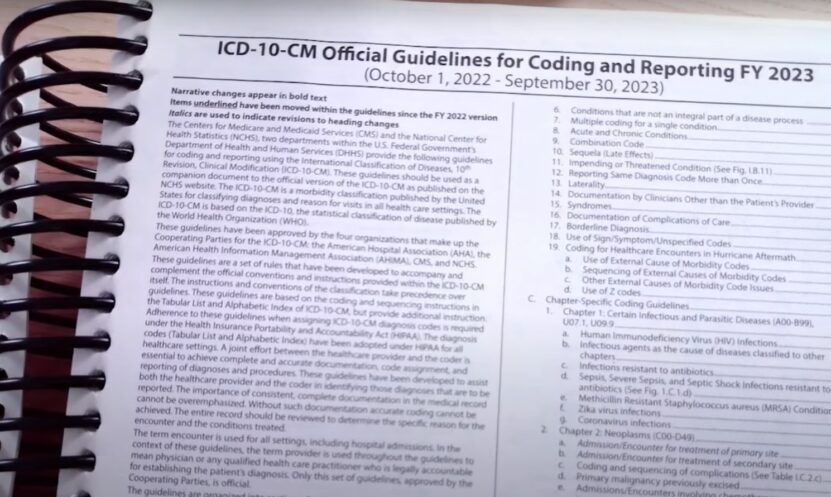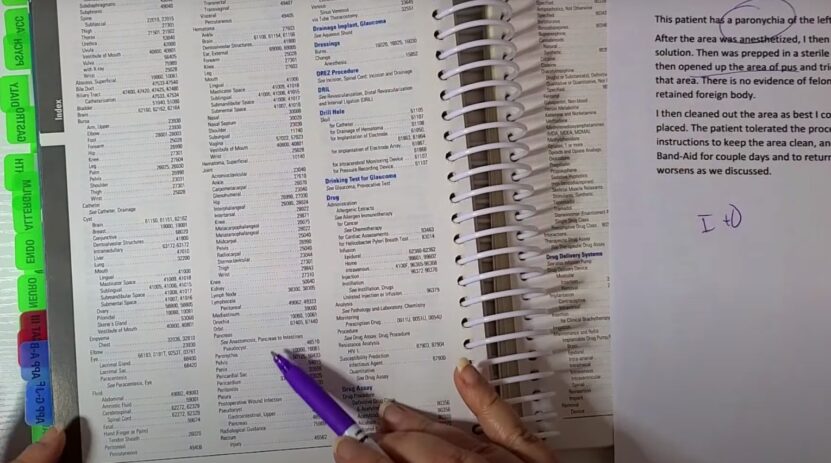Medical coding is a crucial component in the healthcare industry, serving as the backbone for maintaining accurate medical records and ensuring efficient billing processes.
Medical coders are responsible for translating healthcare services, diagnoses, and procedures into standardized codes, which are essential for patient records, insurance billing, and maintaining healthcare data integrity.
Key Takeaway
- The medical coding field is experiencing significant growth, with a 7% increase in job opportunities projected from 2021 to 2031.
- Medical coding certifications, such as CPC, CCS, and CMC, are crucial for establishing credibility and competence in the field.
- The CPC is ideal for outpatient settings, CCS for inpatient settings, and CMC offers a comprehensive understanding of both.
Today, we want to go through various aspects of medical coding certification, its significance, and the pathways to achieving it.
Medical Coding Certifications

Medical coding certifications are specialized credentials designed to demonstrate a coder’s knowledge and skills in the field. These certifications are crucial for anyone looking to establish or advance a career in medical coding. The most common certifications include:
- Certified Professional Coder (CPC)
- Certified Coding Specialist (CCS)
- Certified Medical Coder (CMC)
The CPC certification, offered by the American Academy of Professional Coders (AAPC), is geared towards individuals coding in a physician’s office or outpatient setting. It covers a broad range of coding concepts and practices, making it a popular choice for many aspiring coders.
The CCS certification, available through the American Health Information Management Association (AHIMA), is tailored for coders working in hospital and inpatient settings. It requires a deeper understanding of complex coding systems and medical terminology.
The CMC certification, provided by the Practice Management Institute (PMI), is recognized for its comprehensive approach to coding in various healthcare settings. Each certification has its prerequisites, such as educational background, experience, and specific knowledge in medical terminology and healthcare procedures.
These certifications are not just about passing an exam; they require ongoing education and self-assessment to maintain the credential, ensuring that certified coders stay current with the ever-evolving healthcare industry standards and practices.
Certified Professional Coder (CPC)
The Certified Professional Coder (CPC) certification is a highly sought-after credential offered by the American Academy of Professional Coders (AAPC). It is designed for individuals aiming to excel in medical coding within outpatient healthcare settings, such as physician offices and outpatient clinics.
The CPC certification signifies a comprehensive understanding of medical diagnoses, procedures, and services using the CPT, ICD-10-CM, and HCPCS Level II code sets. To obtain the CPC certification, candidates must demonstrate a thorough knowledge of medical terminology, anatomy, coding guidelines, and healthcare regulations.
While the AAPC recommends having an associate degree and some experience, these are not strict prerequisites. The CPC exam is a rigorous test consisting of 100 multiple-choice questions, covering various scenarios and it requires knowing coding principles and guidelines.
- Candidates are allowed four hours to complete this open-book exam,
- Passing score is set at 70%.
Maintaining the CPC certification requires ongoing education. Certified coders must complete a specified number of Continuing Education Units (CEUs) every two years to keep their knowledge up-to-date and their certification active. This commitment to continuous learning ensures that CPC holders remain at the forefront of the field, adapting to changes in standards and healthcare regulations.
Certified Coding Specialist (CCS)
The Certified Coding Specialist (CCS) certification, offered by the American Health Information Management Association (AHIMA), is tailored for coders specializing in hospital and inpatient settings. The certification is recognized for its emphasis on mastery of inpatient and an understanding of medical records management.
CCS-certified professionals are known for their expertise in coding complex medical cases using ICD-10-CM and ICD-10-PCS code sets, making them valuable assets in hospital departments. To be eligible for the CCS exam, candidates typically need a combination of education and experience in medical coding.
This includes a diploma or degree from a recognized coding program and/or practical experience. The CCS exam is comprehensive, knowledge, skills, documentation, regulatory compliance, and provider queries. It consists of multiple-choice questions and medical scenarios, requiring a score of 300 or higher to pass.
CCS certification holders are required to engage in continuous professional development to maintain their credential. This involves completing a minimum of 20 hours of approved Continuing Education Units (CEUs) every two years and participating in an annual self-assessment.
These requirements ensure that CCS professionals stay current with the latest coding practices and healthcare regulations, maintaining their proficiency and relevance in the dynamic field of medical coding.
Certified Medical Coder (CMC)
The Certified Medical Coder (CMC) certification, offered by the Practice Management Institute (PMI), is a distinguished credential. Unlike the CPC and CCS certifications, the CMC focuses on a more comprehensive insight into coding in various healthcare settings, including both outpatient and inpatient services.
This certification is increasingly recognized for its rigor and the depth of knowledge it represents. Candidates aspiring to become CMC-certified should ideally have at least one year of professional experience in medical coding. This experience provides a practical foundation for the complex scenarios presented in the CMC exam.
The exam itself differs significantly from the CPC and CCS exams, as it is not in a multiple-choice format. Instead, it requires candidates to assess scenarios and accurately fill in the blanks, demonstrating a deeper level of understanding and application of coding principles.
The CMC exam is conducted in a live, proctored setting and is hand-graded to ensure accuracy and fairness.
- Candidates have six hours to complete the exam
- Minimum score of 70% is required for certification
To maintain the CMC certification, coders must earn 12 Continuing Education Units (CEUs) annually, reflecting a commitment to ongoing professional development and staying abreast of changes in the medical field.
Specialized Medical Coding Certifications
In addition to the general medical coding certifications, there are specialized certifications that allow medical coders to focus on specific areas of healthcare.
These specialized certifications, such as the Certified Outpatient Coder (COC) and the Certified Inpatient Coder (CIC), are designed to validate a coder’s expertise in particular settings or medical specialties. The COC certification, for instance, is tailored for coders working in hospital outpatient settings.
It requires knowledge of outpatient coding and an understanding of Ambulatory Payment Classifications (APCs) and payment status indicators.
The CIC certification, on the other hand, is focused on inpatient coding, validating a coder’s expertise in ICD-10-CM and ICD-10-PCS coding, as well as their understanding of Medicare Severity Diagnosis Related Groups (MS-DRGs) and the Inpatient Prospective Payment System (IPPS).
These specialized certifications often require coders to have a foundational certification like the CPC or CCS, in addition to specific experience or training in the specialty area. By obtaining these specialized credentials, medical coders can open doors to advanced career opportunities and potentially higher salaries.
Moreover, some specialized certifications, like the Certified Outpatient Coder (COC) or Certified Inpatient Coder (CIC), demand a comprehensive understanding of medical coding, akin to the expertise required of an ebook creator in their field of publishing.”
This analogy implies the depth of knowledge and expertise necessary for these specialized certifications. Check this out for drawing a parallel to the skill set required in creating ebooks.
Preparing for Medical Coding Certification Exams

Preparing for medical coding certification exams requires a strategic approach, combining theoretical knowledge with practical coding skills. Candidates must familiarize themselves with the specific content and format of their chosen certification exam, whether it’s CPC, CCS, CMC, or a specialized certification.
This preparation typically involves studying guidelines, medical terminology, anatomy, and various systems such as CPT, ICD-10-CM, and HCPCS Level II. Many candidates opt for formal training programs offered by colleges, universities, or online platforms.
These programs are designed to cover all necessary topics and often provide practice exams and exercises. Additionally, joining study groups and participating in forums can offer valuable insights and tips from peers and experienced coders.
Time management is a crucial skill during the exam, especially for comprehensive tests like the CPC and CMC. Familiarity with books and quick reference to guidelines can significantly enhance efficiency. Many exams are open-book, so knowing how to navigate coding manuals effectively is essential.
Practical experience in medical coding, even at an entry-level or through internships, can be invaluable. Real-world coding experience provides a deeper understanding of coding scenarios and challenges, enhancing a candidate’s ability to apply theoretical knowledge in a practical context.
Educational Pathways

The journey to becoming a certified medical coder often begins with formal education. While not always mandatory, completing an educational program in medical coding provides a solid foundation in the key areas required for certification.
Many colleges and universities offer programs specifically designed for aspiring medical coders, ranging from certificate courses to associate and bachelor’s degrees.
These programs typically cover:
- Medical terminology
- Anatomy and physiology
- Coding systems
- Healthcare reimbursement methods
- Legal aspects of health information
Some programs also include practical exercises, internships, or externships, providing valuable hands-on experience. For those who cannot attend traditional on-campus programs, there are numerous online courses and programs available. These online options offer flexibility for individuals who may be working or have other commitments.
It’s important to choose a program that is accredited and recognized by key industry bodies, as this can impact eligibility for certification exams and future employment opportunities. In addition to formal education, aspiring coders should also consider joining professional organizations such as AAPC or AHIMA.
Membership in these organizations provides access to resources, networking opportunities, and continuing education, all of which are beneficial for both exam preparation and career advancement.
FAQs
Which medical coding certification is best for beginners?
For beginners, the CPC certification from the American Academy of Professional Coders (AAPC) is often recommended. It covers a broad range of coding concepts suitable for outpatient settings and is widely recognized in the industry.
What is the difference between a CPC and a COC?
The CPC certification focuses on coding for outpatient settings like physician offices, while the COC certification specializes in coding for outpatient hospital services and facilities. The COC covers additional areas like Ambulatory Payment Classifications and outpatient payment systems.
What is the hardest part of medical coding?
The hardest part of medical coding often involves staying updated with the frequent changes in coding guidelines and healthcare regulations. Accurately interpreting medical records and applying the correct codes can be challenging, requiring a deep understanding of medical terminology and attention to detail.
Summary
Medical coding certification is a critical step for anyone looking to establish or advance a career in the healthcare industry. With the growing demand for skilled coders, certification not only enhances job prospects but also opens doors to higher salaries and career advancement opportunities.
With dedication and commitment, a career in medical coding can be both rewarding and fulfilling, offering a unique blend of technical skill, attention to detail, and a significant contribution to the healthcare system.
If you want to check out more related subjects, be sure to visit our website.
